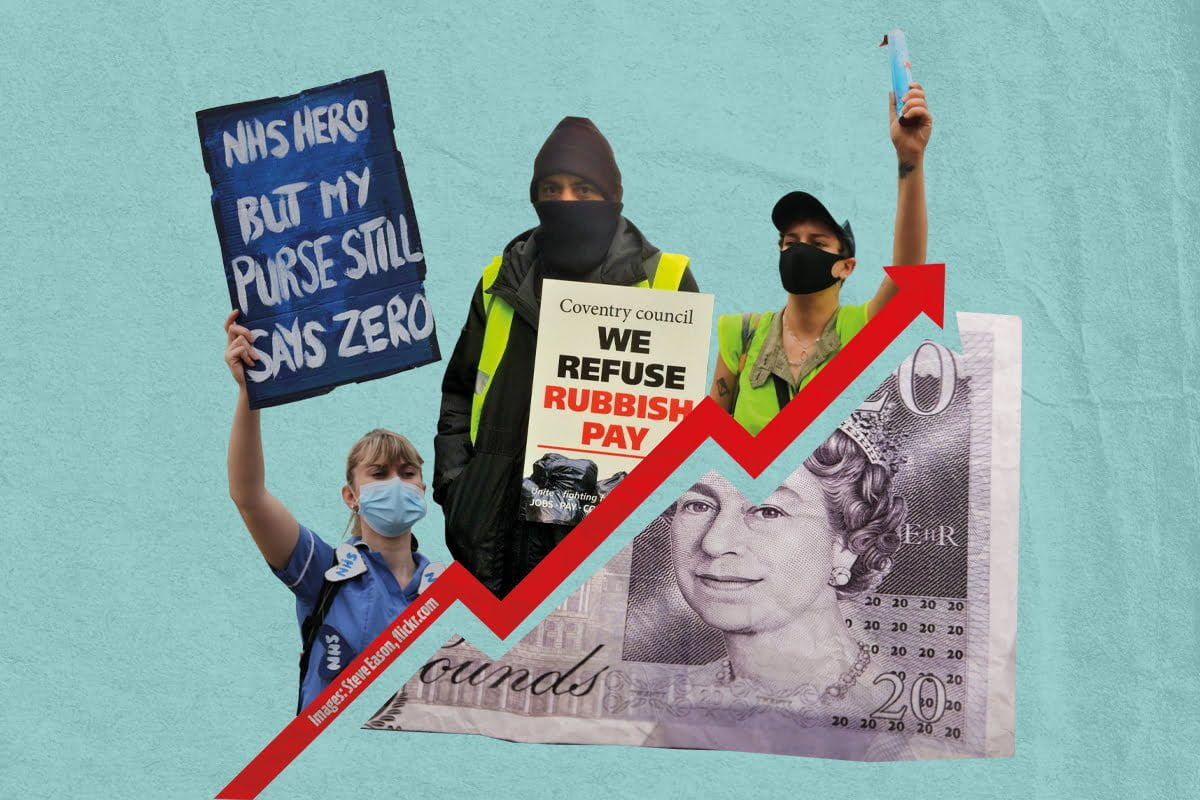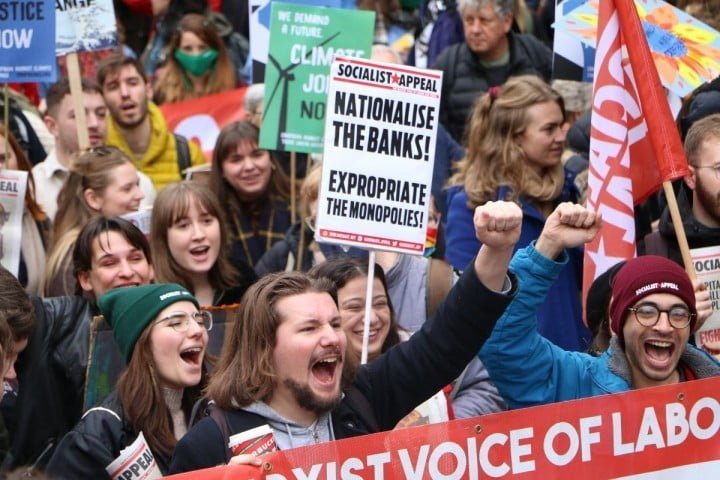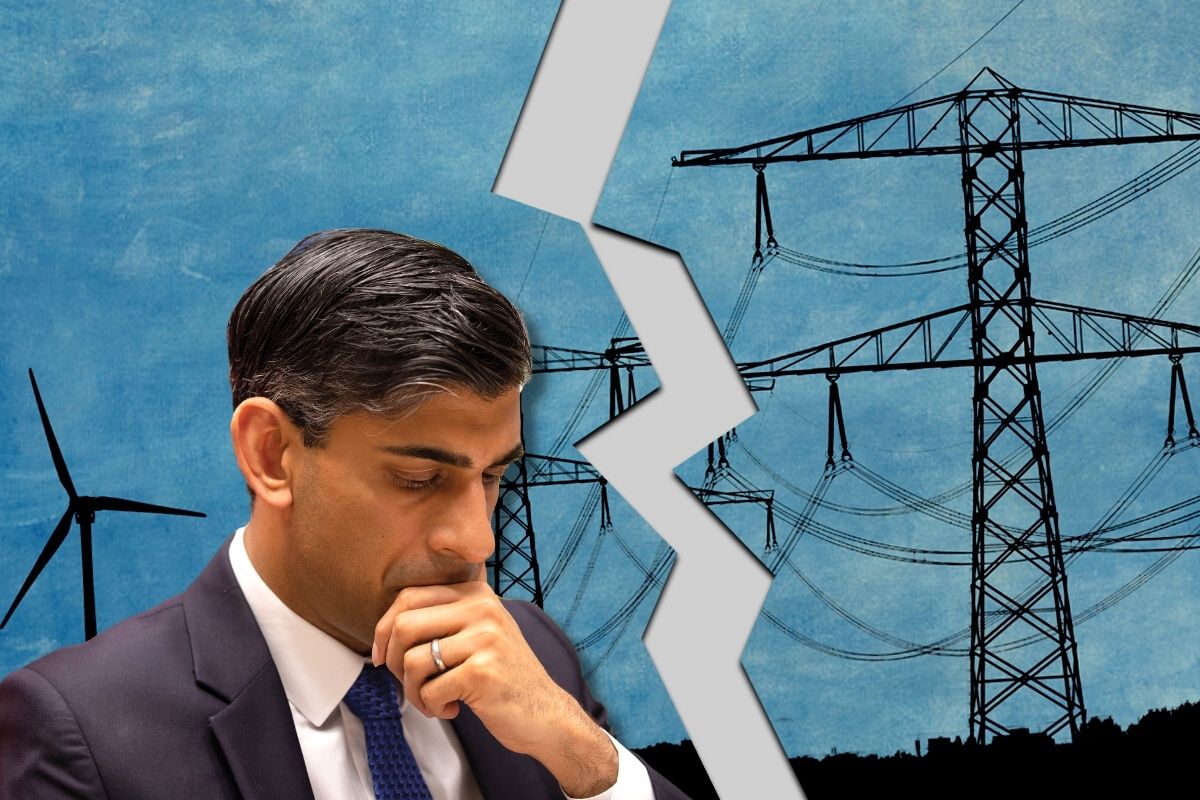The Tories’ recent announcement of a windfall tax on the profits of the big energy producers will provide only a small respite for those struggling with rocketing bills. Only nationalisation and workers’ control can solve the energy crisis.
Last week, Tory Chancellor Rishi Sunak announced a ‘windfall tax’ of 25% on the profits of the oil and gas monopolies, which have soared as a result of rising energy prices.
This tax will help to fund a one-off £400 reduction in energy bills for all households, with those on the lowest incomes and with disabilities receiving up to £1,200.
At best, this is a sticking plaster – and not a very good one.
To combat the cost-of-living crisis, we must fight for nationalisation and workers’ control of the energy industry. Instead of taxation, we need to tackle inflation with expropriation.
Disaster

It cannot be underestimated just how much of a catastrophe rising energy bills are for millions of working-class people.
The 54% jump in the price cap in April equates to an average increase of around £700 per year per household. As a result, Citizens Advice estimates that around five million adults will be unable to afford to pay their energy bills – forced either to go into debt or arrears, or to cut back on essential usage for heating and cooking.
Recently, for example, a horrifying story emerged of a pensioner in Harrogate who travelled around on buses all day because they could not afford to heat their home. And this is likely to be just the tip of the iceberg, with many others facing a similarly dire situation.
This in itself would be a disaster. But the energy price cap is due to increase by another £800 in October, with further rises predicted for next year. And this is before other escalating living costs are factored in, with inflation – already at 9% – predicted to climb to over 10% in the coming months.
Consequently, the aforementioned Citizens Advice report estimates that the number of people unable to pay their energy bills may rise to 14 million – or 1-in-4 of the UK adult population – by the winter.
Profits

It’s not bad news for everyone though. There have been some big winners from this crisis – namely, the energy giants.
It is estimated, for example, that the 28 largest oil and gas companies in the world made a combined $100 billion profit just in the first three months of this year.
These profits are so obscene that even the chief financial officer of fossil fuel supermajor BP, Murray Auchincloss, admitted that his company is making more money than even they know what to do with!
With millions in fuel poverty on one side, and eye-watering profits for the bosses on the other, Sunak has stepped in to offer some crumbs – sowing the illusion that he is taking action against the energy monopolies, whilst leaving the capitalists to continue with their profiteering in the long-run.
Anger

The timing of Sunak’s recent announcement is also highly suspicious, coming on the back of the Gray report into partygate.
Anger is mounting at the Tories’ consistent breaching of lockdown rules, which have once again highlighted to ordinary people just how out-of-touch and arrogant this criminal government really is.
Added to this are a growing pile of crises and scandals facing Boris Johnson’s government: looming stagflation; a confrontation with the EU over the Northern Irish Protocol; and the prospect of nationwide strike action on Britain’s railways.
Not only is Sunak’s windfall tax a tokenistic gesture against the energy companies, therefore, but it is also a cynical attempt to deflect and divert all this discontent away from the Tories.
Flaws
Aside from clearly being a distraction, Sunak’s latest package of support has several fairly obvious flaws.
For starters, most households will only be entitled to a single £400 reduction in their energy bills. But the estimated increase in October alone will amount to £800 per year. And this comes on top of the £700 per year increase seen in April.
Even the poorest households will only be entitled to a solitary £1200 bill reduction, compared to the predicted £1500 average annual increase in energy costs.
And again, this support is simply a one-time only offer. But as previously mentioned, energy experts are predicting that bills will continue to increase next year – particularly if the conflict in Ukraine is protracted, or if oil and gas supplies from Russia are disrupted by western sanctions or retaliation from Moscow.
Even in a best-case scenario, it is widely believed that bills will not return to ‘normal’ levels until at least the end of next year.
Failure

At the same time, Sunak’s new ‘levy’ is estimated to raise just £5 billion, whereas the promised support package will cost around £15 billion. The £10 billion shortfall will be covered by public borrowing. This, in turn, means further austerity elsewhere in the government’s budget.
What the Chancellor is giving workers in the short term with one hand, in other words, will simply be taken away from them down the line with the other.
To put this in comparison, in the first quarter of this year, Shell and BP reported bumper profits of around £7.3 billion and £5 billion respectively. The Tories’ windfall tax is therefore a mere drop in the ocean for these fossil fuel behemoths.
Nor does this tax do anything to address long-term problems facing the energy industry: the lack of investment in infrastructure and storage, which has left the country vulnerable to swings in supply and demand; the need to insulate millions of homes, in order to reduce heating costs; or the existential question of the climate crisis, and the urgent necessity for a green transition to renewable technologies.
All of these problems have arisen due to the utter failure of the capitalist market, which causes nothing but chaos and misery for the working class. And a one-off tax – a mere slap on the wrist for fat-cat energy bosses – offers no real solution.
Threats
Despite the total inadequacy of Sunak’s windfall tax, it has nevertheless sparked a furious reaction from the capitalist class and its representatives.
Acting as a mouthpiece for big business, for example, Tory backbencher Richard Drax farically accused the Chancellor of “throwing red meat to socialists”.
Several of the huge energy producers, meanwhile, have threatened to ‘review’ their proposed investments in the UK, citing the uncertainty created by Sunak’s sudden U-turn on this question.
Ultimately, these threats from the bosses show one thing: that it is not possible to regulate these parasites, or to reform their profit-driven system.
The capitalists produce to make a profit, not to meet the vital needs of people and the planet. Taxes and price controls, in this respect, will only ever result in strikes of capital, or monopoly bosses passing on costs to the working class.
Expropriation

The resources, wealth, and technologies needed to tackle the energy crisis – and to combat the climate catastrophe – already exist. But they currently sit in the hands of the capitalists, under their ownership and control.
The only genuine solution, therefore, is for expropriation of the energy monopolies and their profits – including both the fossil fuel giants and the big utility companies – under workers’ control, as part of a socialist plan for the entire sector, and for the wider economy.
Only through such measures can we end this disgusting injustice, where millions are at risk of freezing to death, while the bosses laugh all the way to the bank.






